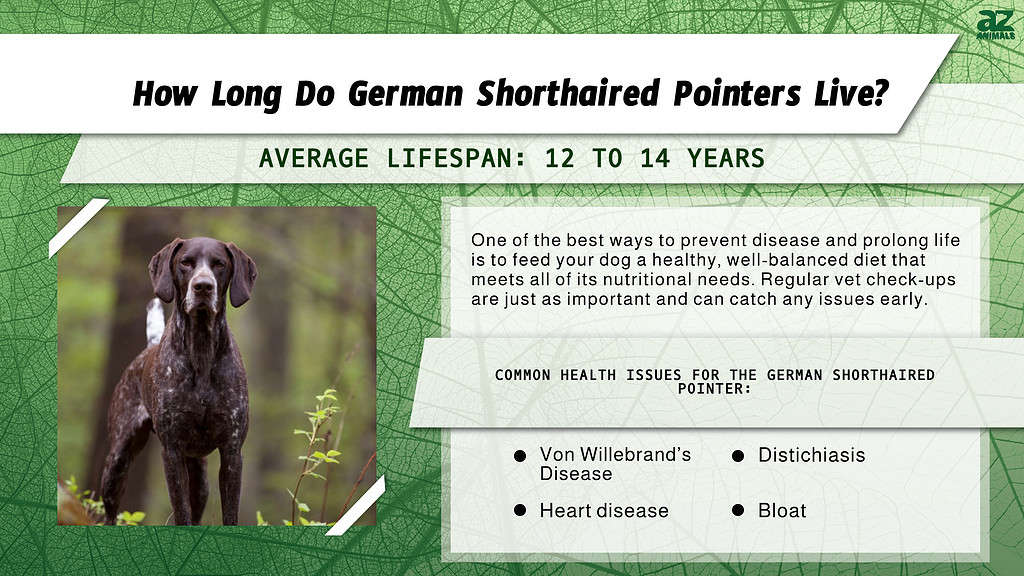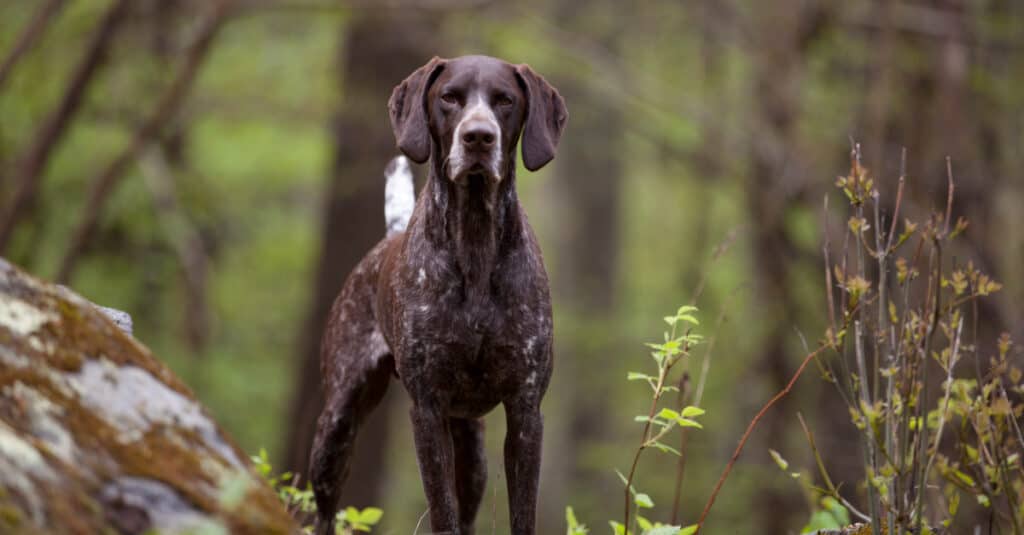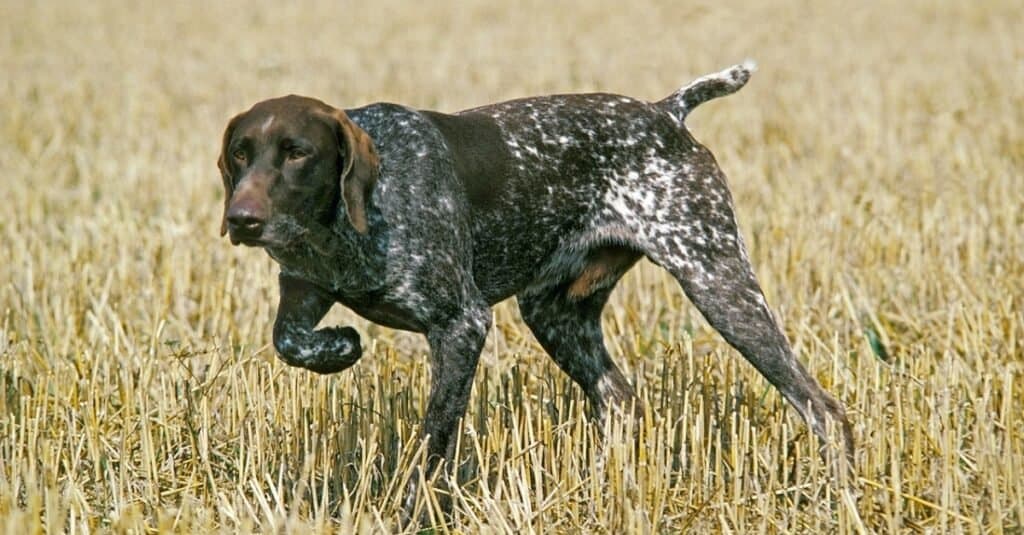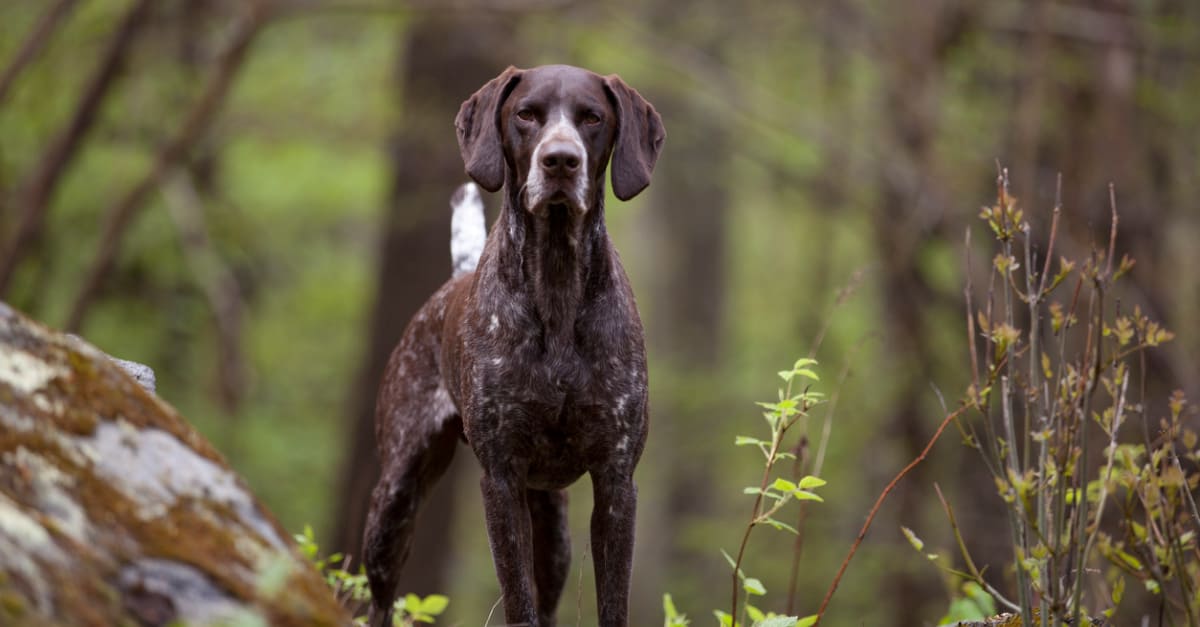
As pet owners, we know that our furry friends don’t live as long as humans. But we also know that there are breeds that live longer than others and that there are ways to increase their life. Staying on top of health issues, providing proper nutrition, and ensuring they get enough exercise are just a few ways you can prolong your dog’s life. But what about the German shorthaired pointer’s lifespan? How long do they live? Find out now, including what factors impact their longevity and actionable ways you can prolong their life.
German Shorthaired Pointer: An Overview

German Shorthaired Pointers were bred for hunting and retrieving
©iStock.com/BranstonandTwiglet
These medium-sized pointing dogs were originally bred in Germany during the 19th century for hunting and retrieving. They have a strong prey drive, and their bodies are built for endurance. But their willing-to-please attitudes and friendly disposition make them excellent companion dogs, as well.
German shorthaired pointers stand 21 to 25 inches tall and weigh between 45 and 70 pounds, with females on the smaller end. They have smooth, short coats and dense undercoats that keep them comfortable in warm or cool weather. And their fur is also water resistant.
These dogs are loving and affectionate with their families, and they do well with young children and other dogs. They are also open to strangers, adapt easily to new circumstances, and have a protective nature. The German shorthaired pointer is easy to train, which is good because they have very high energy needs and require plenty of mental stimulation. This breed does best with highly active families who can appreciate their boundless energy and love for the outdoors.
How Long Do German Shorthaired Pointers Live?

German shorthaired pointer lifespan: 12 to 14 years
©iStock.com/slowmotiongli
Thankfully, this breed is known for having a higher life expectancy than most dogs with a similar size. The German shorthaired pointer’s lifespan averages 12 to 14 years. But they have been known to reach up to 18.
German shorthaired pointers are a generally healthy breed, but they are prone to several health problems. This breed also requires lots of exercise to stay happy and healthy. But other than their high energy needs and mental stimulation, these dogs are relatively low maintenance. And they have no problem lounging on the couch with their loved ones after spending the day playing and working.
Many factors affect the German shorthaired pointer’s lifespan, including health issues, diet, exercise, and routine health care. Let’s discuss some of them now.
Factors That Impact German Shorthaired Pointer Lifespan

German Shorthaired Pointers are predisposed to several health problems
©iStock.com/Eriklam
This breed is generally healthy and long-living. But the leading cause of death for a German shorthaired pointer is cancer, especially for those in their golden years. But with frequent check-ups and preventative measures, your dog can live a long, healthy life.
Underlying Health Issues
German shorthaired pointers are predisposed to several health problems. This does not mean they will fall victim to these diseases, just that they are more common within their breed.
They are more prone to mast cell tumors, which is a type of skin cancer. These tumors can look like many forms of lumps and lesions, so it’s important to get any new or suspicious lumps checked out and removed. GSPs can also develop bleeding tumors, primarily in the spleen. These tumors can cause internal bleeding, but thankfully, they are often caught during routine wellness testing.
Here are some other health problems to look out for:
- Dental Disease
- Bacterial and viral infections
- Bloat
- Von Willebrand’s Disease
- Distichiasis (extra hairs grow inside the eyelid)
- Hip and elbow dysplasia
- Joint disease
- Bone inflammation
- Spinal deformities
- Heart disease
- Addison’s disease
- Seizures
- Lymphedema
Diet and Exercise
One of the best ways to prevent disease and prolong life is to feed your dog a healthy, well-balanced diet that meets all of its nutritional and energy needs. Due to their high energy levels, German shorthaired pointers need a higher level of fat and protein than most breeds. They should get between two to five cups of food per day, which will vary depending on their activity and metabolism. It is also best to focus on a diet full of fresh ingredients, such as chicken, fish, rice, and sweet potato.
German shorthaired pointers can also develop obesity, which can worsen other problems like joint inflammation and heart disease. Ensure your GSP is meeting all of its nutritional needs without overindulging and putting on weight.
To keep their weight in check and increase their lifespan, this breed should get at least one to two hours of vigorous exercise each day. Active families can take their German shorthaired pointer for walks, hikes, swims, runs, or any other activity that fits with their lifestyle.
How to Increase Your German Shorthaired Pointer’s Life
Here are some ways you can keep your German shorthaired pointer healthy and increase its lifespan.
- Give them plenty of opportunities for exercise every day
- Give them jobs and keep them entertained
- Feed them a healthy high protein and good fat diet
- Brush their teeth and keep up with dental hygiene
- Look for any suspicious lesions and lumps
- Schedule regular wellness checks and routine screenings
- Ensure they stay within a healthy weight range
- Regularly test and use preventative medicines for parasites
- Have them spayed or neutered
- Get their eyes checked regularly
- Feed them a large-breed puppy diet and ensure they are gaining no more than four pounds a week (puppies only)
- Take their pain seriously
Ready to discover the top 10 cutest dog breeds in the entire world?
How about the fastest dogs, the largest dogs and those that are -- quite frankly -- just the kindest dogs on the planet? Each day, AZ Animals sends out lists just like this to our thousands of email subscribers. And the best part? It's FREE. Join today by entering your email below.
Thank you for reading! Have some feedback for us? Contact the AZ Animals editorial team.








